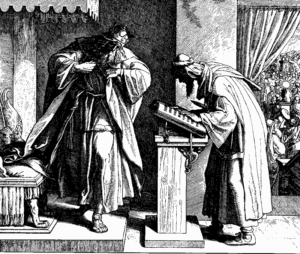 Josiah, “the righteous king,” was Manasseh’s grandson. His reign (640-09) was marked by a powerful religious revival, reminiscent of the time of his great-grandfather. Hezekiah’s contemporary had been the prophet Isaiah. The prophet in the period of Josiah was the great Jeremiah.
Josiah, “the righteous king,” was Manasseh’s grandson. His reign (640-09) was marked by a powerful religious revival, reminiscent of the time of his great-grandfather. Hezekiah’s contemporary had been the prophet Isaiah. The prophet in the period of Josiah was the great Jeremiah.
Josiah’s departure form the pagan ways of Manasseh and his efforts to restore the purity of the Jewish religion received a dramatic spur by the discovery of a sacred “book of the law” in the Temple. It is generally accepted by scholars to have been some form of the biblical Book of Deuteronomy, and it was apparently discovered while the Temple was being repaired and renovated. The High Priest handed it to the king’s scribe and the scribe brought it to Josiah and read it before him. The king was overwhelmed by the stern denunciations in the Book against the neglect of its laws, and was moved to take urgent measures to fulfill its commands. His first step was to assemble “all the men of Judah and all the inhabitants of Jerusalem with him, and the priest, and the prophets, and all the people, both small and great” in the Temple compound, and “he read in their ears all the words of the book of the covenant which was found in the house of the Lord.”
What followed swiftly was the destruction of all the pagan altars and places of idolatrous worship in the territory “from Geba to Beersheba”—the limits of Judah—and a rigid ban on pagan practices, particularly child sacrifice, “that no man might make his son or his daughter to pass through the fire to Moloch.”
National worship was centralized in Jerusalem and recognition of the one sanctuary for the One God, the Temple, weakened with the split of the kingdom after Solomon, was now settled once and for all. Jerusalem was the shrine of the one great system of ethical and intellectual monotheism in the ancient world.
The Assyrian decline, which Josiah had exploited, was to prove his own downfall, and shortly afterwards, the temporary downfall of Judah and Jerusalem. Contenders for the succession of the great Assyrian empire were Babylon in the northeast and Egypt in the southwest. Judah, lying between them, was crushed in the ensuing struggle, in which the Babylonians eventually came out on top.
By the year 602, Judah had become a vassal state within the Babylonian empire. The young king Jehoiachin (grandson of Josiah), his mother, notables, craftsmen and artisans were deported to Babylon. The king’s uncle, Zedekiah, was left behind as puppet ruler in Jerusalem. For several years, Judah remained submissive, the mood of revolt kept at a low key. Elements urging resistance were restrained. But these later got the upper hand, and in about the year 588 they rebelled. The Babylonians moved south to crush them, and encamped outside the gates of Jerusalem.
There was no surrender, the people resolving to defend the city. No immediate attempt was made to storm its ramparts. Instead, the Babylonians built a siege wall round it to starve the inhabitants, but they abandoned it in the middle in order to deal with a threat from Egypt. They soon returned to Jerusalem, however, and resumed their blockade.
For many months Jerusalem held out. There were times when Zedekiah thought of surrender. The prophet Jeremiah, too, thought resistance futile—but for a different reason- he foresaw the temporary fall of Jerusalem because of its iniquities. The people, however, listened to neither, and stubbornly insisted on holding out.
In mid-summer of the year 587, the walls of the starving city were breached, the battering rams piercing the northern defenses. The king and some of his guards “fled by night by the way of the gate between two walls, which is by the king’s garden.” They were pursued, and Zedekiah was captured “in the plains of Jericho.” His end was cruel. Brought before Nebuchadnezzar, he was made to witness the slaying of his sons, and then his eyes were put out. He was carried off in chains to Babylon and there he died.
A month after the fall of the city, Nebuchadnezzar sent one of his commanders to Jerusalem with instructions to level it. “He burnt the house of the Lord, and the king’s house, and all the houses of Jerusalem…and brake down the walls of Jerusalem round about.” The precious Temple ornaments “and such things as were of gold…the captain of the guard took away.” Some of the prominent citizens (who had escaped the earlier deportations) were executed. The rest were deported to Babylon.
Thus fell Jerusalem, and thus was the Temple destroyed. In its carnage and ruin, bereft of its people, Jerusalem became the desolate city.